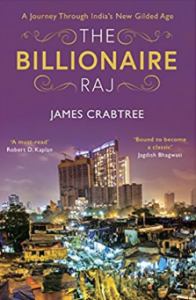
Equality and privilege in the midst of emerging superpower


India one of the most divided nations on the planet aspiring to become the next superpower. James Crabtree reveals the titans of politics and industry-shaping India in a period of rapid change – from controversial Prime Minister Narendra Modi to the leading lights of the country’s burgeoning billionaire class.
India is the world’s largest democracy, with over one billion people and an economy rapidly expanding faster than China’s, as the rewards of this growth have been far from evenly shared, and the country’s top 1 per cent now own nearly 60 per cent of its wealth. Mumbai, the financial capital of India, half the people live in slums, the extraordinary riches of India’s new dynasties echo the Vanderbilts and Rockefellers of yesterday, funnelling profits from huge conglomerates into lifestyles of conspicuous consumption.
A must-read book, for all those interested in the political and economic destiny of the subcontinent, wealth and inequality and the evolution of capitalism. The extremes in India changing with bewildering rapidity and the one world will find increasingly hard to ignore.
With the “King of the Good Times” Vijay Mallya languishing in exile in Britain, living in extravagant homes, and tycoons exert huge power in both business and politics while issuing jewel-encrusted invitations to their children’s weddings. Explosive India’s economic rise driven by inequality to new extremes according to Crabtree, as millions are trapped in slums and endemic corruption. Reformers flight to wrest the nation from these dark forces, leaving its fate poised between that of a prosperous democratic giant and a saffron-tinged version of Russia.
Former Financial Times Mumbai Bureau chief Crabtree writes about a Mumbai apartment tower built by billionaire Mukesh Ambani to be the pre-eminent symbol of the power of India’s new elite,” a clear distinction between the merely rich and the superrich. The creation of a class of hyper-wealthy commoners owes some responsibility to domestic economic reforms so as to advance a free market, modernisation and globalisation, ushered in the mist of corruption with the government machinery simply unable keep up with a wave of crony capitalism.
Crabtree writes “ In 1991 reforms, gave Indians a taste of a new world of mobile phones, multi-channel television and foreign consumer goods and an enthusiasm for globalisation, where many layers of bureaucracy to try “ to strike a deal towards the top of the decision-making chain.” Corruption has not been eradicated under the “big-government conservative“ Narendra Modi who will in his second term yield to the temptation to substitute nationalism for economic reform, following the paths set by Russia’s Putin and Turkey’s Erdogan.
Last month Narendra Modi speaking from Red Fort wants to put fairness at the heart of his political agenda as he promised, “a New India, where there is equal opportunity for all “ by 2022, the 75th anniversary of independence. The share of national income taken by the top 1 per cent of Indian income earners is now at its highest level a staggering 58 per cent of national wealth – one of the world’s highest rates held by its swelling ranks of billionaires, since records began, when the British Raj began collection income tax records in 1922. Is India becoming a “ Billionaire Raj?”.
India appears to be growing unequal more quickly and more starkly than most, a trend which may be hard to reverse later, with poor public policy, corruption and cronyism.
The gap between rich and poor is growing rapidly as Modi aspires to his ambition of hitting double-digit growth rates.
India needs to improve basic social services at the bottom while using the competition policy and regulation to stamp out crony capitalism and mega-corporate power at the top.
Class and cast reformers striving to bring down the corrupt tycoons and political power brokers who enable them, James Crabtree paints a vivid portrait of a divided nation whose future will shape the world.
The Billionaire Raj, A Journey through India’s new gilded age by James Crabtree, published by Random House and One world, on Jul 03, 2018,416 pages
